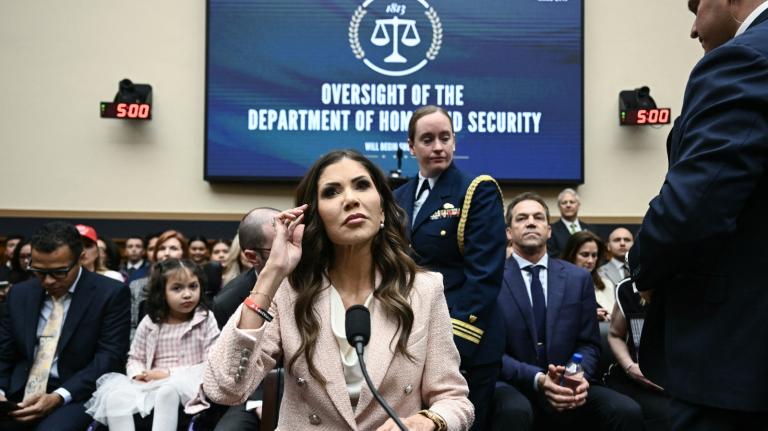First things first: Our story left off at the COP-15 negotiations, minutes after world leaders released their three-page Copenhagen Accord [pdf], a broad statement of political intent to address the issues that — according to the (old) U.N. schedule — should have been addressed by now. This result begs the question: Did 2009 end with more or with less ambiguity about how to address climate change? The potential answers feel more like a Rorschach test than points of debate.
We do know certain things: No one has any illusions about the difficulty of bringing the community of nations to agreement on how to rebuild the global energy economy. We know that the United Nations process failed to produce a legally binding emissions-reduction and sustainable-development treaty. Or even a political agreement that offers clear guidance to a treaty. We know that China frustrated European and American leaders at key moments, even blocking discussion of national efforts in the Accord, a move that caused German Chancellor Angela German Merkel to demand, “Why can’t we even mention our own targets?” It will be interesting to watch the build-up to COP-16, in Mexico City this November, given the certainly dramatic, inevitably anti-climactic (anti-climatic?), year-long sprint to Copenhagen.
We are confident that we have very little idea what course the U.S. Senate will take in coming weeks and months. The leadership troika of Sens. John Kerry (D-Mass.), Lindsey Graham (R-S.C.), and Joe Lieberman (I-Conn.) appears to be pushing ahead, despite the pessimism engulfing much of the chattering class. Political intrigue erupted this week when two Democratic senators, Christopher Dodd of Connecticut and Byron Dorgan of North Dakota, announced their retirements, putting at risk the majority’s ability to maintain a filibuster-defeating voting block. We continue to expect global media interest in geo-engineering to vary inversely with media interest in emissions reductions. And we know that observable phenomena consistent with warming predictions continue to emerge.
Continued international and U.S. policy uncertainty puts renewed spotlight on nascent regional programs, and on the private sector. Companies making up the FTSE 100 are, on average, projecting that they will meet the U.K.’s target of a two-to-three percent reduction annually, according to a new Carbon Disclosure Project report. Global investment managers (not, of course, compelled to act, as FTSE firms are, by a new U.K. law) have yet to substantially incorporate climate risk assessments into their portfolios. Perhaps Google will find a way to solve some of the complications involved in the struggle toward carbon neutrality.
The Center for Public Integrity prefaces the coming activity on climate legislation with a deep dive into lobbying records. The number of registered businesses and groups hovered steadily, around 1,160. But that number conceals about 140 newcomers to the debate, including highly visible consumer firms, such as Campbell Soup Company, Kellogg Company, and Del Monte Foods. “[T]he domestic politics are only growing ‘curiouser and curiouser,’ as Alice might say from Wonderland,” report Marianne Lavelle and M.B. Pell.
New Year’s resolutions: The holiday break gave Climate Post some time to think about this project, the year passed, and the year ahead (and, for a goof, to begin reading the “climategate” e-mails). And a slow news week opens up space to share thoughts.
The conceit of traditional news-gathering, and by extension, this blog, is that what just happened is more important than anything else. After all, it is called “the news,” and not “the recentlies” or “the interestings.” But given the sweep of information available to each of us with the touch of a key, there’s no longer a reason to limit ourselves to the news, when “the recentlies” and “the interestings” can really enrich the conversation.
So, how can we enrich the conversation? First, by acknowledging that it’s a conversation. Climate Post is a community, a smallish, newish one, and I’m curious about how to make this fact a little bit more visible. This missive goes out to friends of the Nicholas Institute for Environmental Policy Solutions and Duke University, and is reproduced at the environmental magazine, Grist.org.
Energy and climate change, and all they encompass — economics, policy, science, business, competing values — are extraordinarily complicated, hence the initial idea for Climate Post to begin with. So, other than what’s “news” in a given week, what can we help you with? What came up at a dinner party over the holidays that no one could answer, or that sparked an hour-long discussion, or is reported in contradictory ways? There’s an opportunity here for Climate Post to become something of an information or research concierge, particularly in regard to policy and the work of my colleagues at the Institute. Again, in policy, science, business, behavior, it takes a lot of listening and learning just to become comfortable with what the solutions are.
Space restraints being what they are (i.e., restraining), we won’t be able to hit every desirable topic every week. But hopefully the swarm will guide us all toward engaging, informative, and productive conversation, while still flying close to the original mission. This blog is my blog. This blog is your blog. This blog was made for you and me.
Eric Roston is Senior Associate at the Nicholas Institute and author of The Carbon Age: How Life’s Core Element Has Become Civilization’s Greatest Threat. Prologue available at here.
The Climate Post offers a rundown of the week in climate and energy news. It is produced each Thursday by Duke University’s Nicholas Institute for Environmental Policy Solutions.



